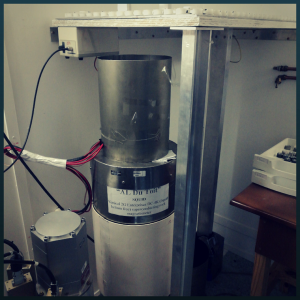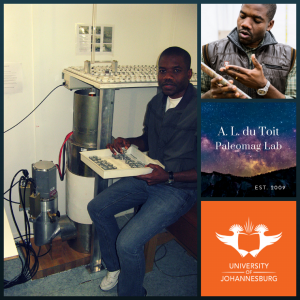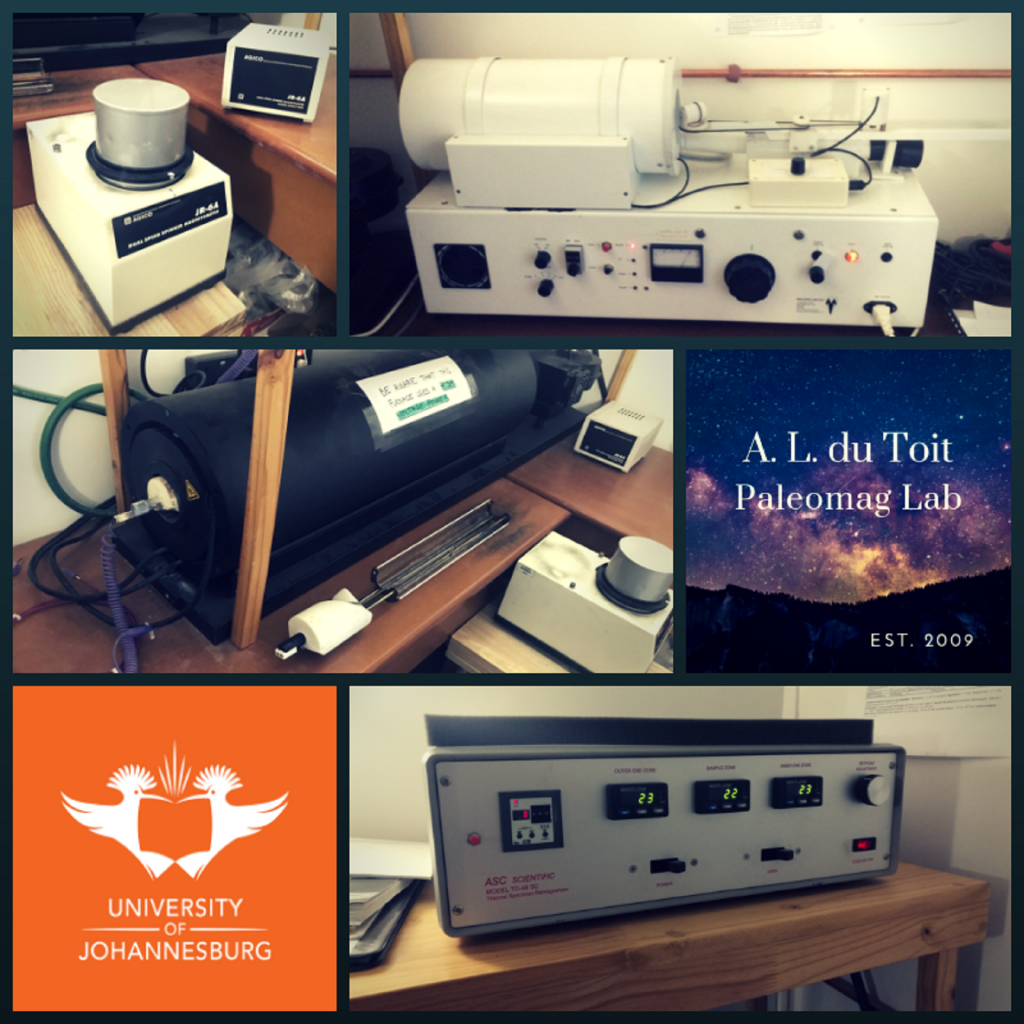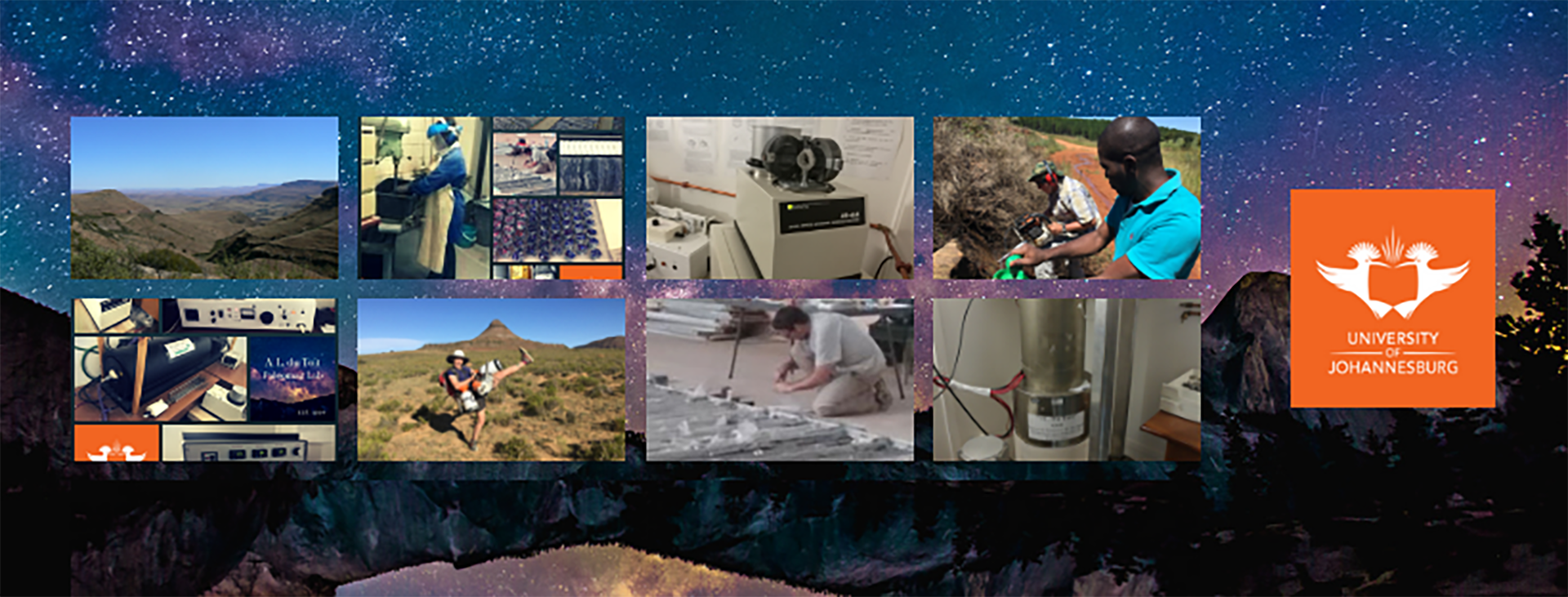Paleomagnetism Laboratory
Home » Faculties of Science » Departments » Geology » Facilities »
Welcome to the Paleomagnetism Laboratory
The Alex. L. du Toit Paleomagnetism Laboratory is part of the Rock and Paleomagnetism Instrument Development “RAPID” Consortium . It is dedicated to igneous and sedimentary rock magnetism and is the sole paleomag lab located on the African Continent.
Paleomagnetism is a unique field that relies on both the stability and instability of the Earth’s magnetic field to reconstruct plate tectonic history. Paleomagnetic studies are used to trace the “paths of drift of continents” through time. Magnetism gets recorded in rocks when they form – like many tiny compass needles pointing north being “frozen” into the rock. Measurement of the magnetic directions in rocks enables us to determine the orientation and latitude of the rock mass at the time of its formation. It allows the reconstruction of the components of ancient continents, now fragmented by plate tectonics. Paleomagnetic data can also date rock successions indirectly.
Contact us
| People: Head of Department: | Address: C1 Lab 332A Department of Geology APK Campus, University of Johannesburg PO Box 524, Auckland Park 2006 |
Instruments
The UJ Pmag Lab is fully shielded and equipped with all the standard instruments necessary for paleomagnetic investigation:
| SQUID Magnetometer | Our primary magnetometer is a 2G Enterprises vertically-oriented Super-Conducting Quantum Interference Device “SQUID” magnetometer with automated sample changer. This system allows for the rapid acquisition of paleomagnetic data with high precision and sensitivity. |   |
| Spinner Magnetometer | The Pmag Lab also carries an AGICO JR-6A Dual Speed “Spinner” Magnetometer suitable for measuring rocks with higher magnetic intensities, such as lavas and dykes. This device can then also be used to acquire paleomagnetic data in complement of the SQUID (but with a lower precision). |  |
| Alternating Field Demagnetization | AF demagnetization can be conducted using our Molspin Limited Shielded Demagnetizer or on the SQUID, which has AF demagnetization capability. | |
| Thermal Demagnetization | Thermal demagnetization is conducted using our ASC Scientific TD-48 SC shielded oven. |
Our Research
The main drivers of the research coming out of the Pmag Lab are diverse (see publications) and the studies are geographically far reaching, from our home base of the Archean-Proterozoic Kaapvaal craton (~3.6 – 1.8 Ga) and the Paleozoic-Mesozoic Main Karoo Basin (Carboniferous – 183 Ma) in southern Africa, to India and Antarctica.
Recent publications:
- Wabo, H., Humbert, F., de Kock, M.O., Belyanin, G., Maré, L.P., Beukes N.J., Kramers, J., (2019). Constraining the chronology of the Mashishing dykes from the eastern Kaapvaal craton in South Africa. In: Srivastava R., Ernst R., Peng P. (eds) Dyke Swarms of the World: A Modern Perspective. Springer Geology, p215-261. https://doi.org/10.1007/978-981-13-1666-1_6
- Wabo, H., Maré, L.P., Beukes, N.J., Kruger, S.J., Humbert, F., de Kock., M.O. (2018). Mineral transformations during thermal demagnetization of sideritic jasper mesobands in jaspilites of the ~3.25 Ga Fig Tree Group in the Barberton Greenstone Belt, Kaapvaal craton (South Africa). South African Journal of Geology 121, 131-140. https://doi.org/10.25131/sajg.121.0010
- Humbert, F., Sonnette, L., de Kock, M.O., Robion, P., Horng, C.S, Cousture, A., Wabo, H. (2017). Paleomagnetism of the early Paleoproterozoic, volcanic Hekpoort Formation (Transvaal Supergroup) of the Kaapvaal craton, South Africa. Geophysical Journal International 209, 842–865. https://doi.org/10.1093/gji/ggx055
- Sciscio, L., de Kock, M., Bordy, E. and Knoll, F., 2017. Magnetostratigraphy across the Triassic-Jurassic boundary in the main Karoo Basin. Gondwana Research, 51, pp.177-192. https://doi.org/10.1016/j.gr.2017.07.009
Magnetism databases & useful links
- Rapid Consortium
Rock and Paleomagnetism Instrument Development Consortium – “a multi-campus virtual institute devoted to improving the speed and precision of paleomagnetic and rock magnetic measurements” - MagIC
Magnetic Information Consortium - The Essentials of Paleomagnetism
Online textbook by Lisa Tauxe (Scripps Institution of Oceanography) - Paleomagnetism: Magnetic Domains to Geologic Terranes
Book by R.B. Butler (University of Portland) - Paleomagnetism.org
Online calculation of paleomagnetic statistics - Paleomagia Precambrian Database
Extensive and easy-to-access database of worldwide Precambrian paleomagnetic data

